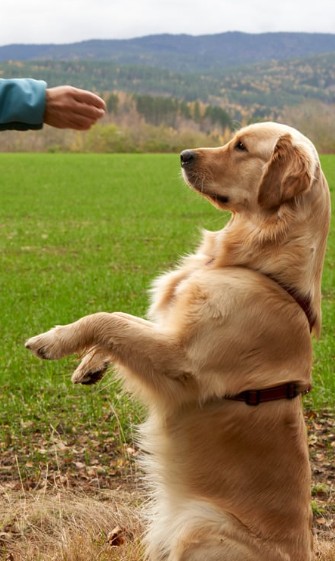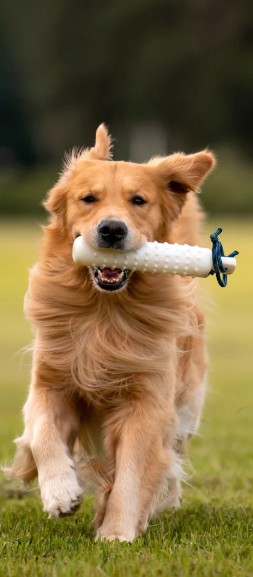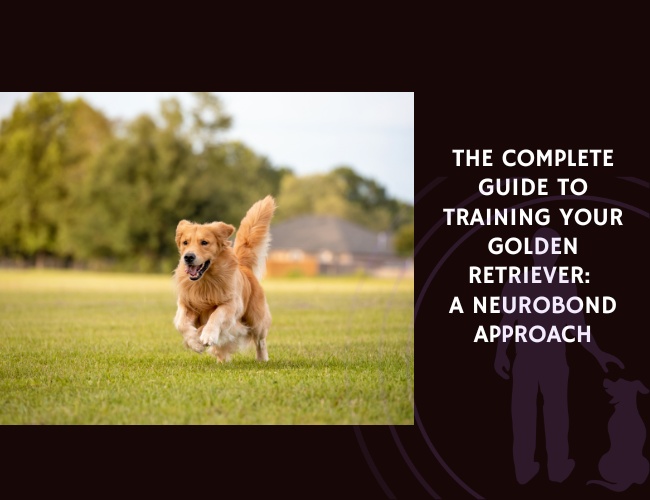Your Golden Retriever gazes at you with those gentle, intelligent eyes, their feathered tail sweeping in hopeful arcs, and you sense the depth of potential waiting to unfold. Let us guide you through a training approach that honors your Golden’s sensitive nature while building the profound connection you both seek.
Character & Behavior: Understanding Your Golden Retriever’s Mind
The Golden Retriever embodies a remarkable paradox—simultaneously eager to please yet capable of independent thought, sensitive to correction yet resilient in spirit. This unique behavioral blueprint stems from their development as hunting companions who needed both to follow direction and make autonomous decisions in the field.
The Emotional Operating System Your Golden Retriever processes the world through an exceptionally refined emotional filter. Their heightened sensitivity means they don’t just respond to your commands—they absorb your entire emotional state. This neurological sensitivity creates a dog who reads your stress before you’re aware of it, who mirrors your joy, and who may shut down completely when faced with harsh correction.
Natural Behavioral Patterns Observe your Golden throughout the day, and you’ll notice distinctive patterns:
- The gentle mouth carry—soft retrieval of objects, presented with pride
- The proximity dance—close enough to touch, but respectful of space
- The thinking pause—that moment of assessment before action
- The social monitoring—constantly checking the emotional temperature of their environment
These behaviors reveal a dog who thinks before acting, who seeks harmony over conflict, and who carries centuries of cooperative breeding in every gesture. Understanding this transforms training from instruction to conversation. 🧡
Vocalization & Communication: How Your Golden Retriever ‘Talks’
Golden Retrievers communicate through subtle, nuanced signals that reflect their sensitive and thoughtful nature. Unlike more vocal breeds, Goldens often speak in whispers rather than shouts.
The Golden Sound Library
- The Greeting Rumble: A low, throaty sound of contentment when reuniting—pure emotional expression
- The Alert Woof: Single, purposeful barks that say “attention needed here”—never excessive
- The Worry Whine: High-pitched, brief vocalizations indicating uncertainty or mild stress
- The Contentment Sigh: Deep exhalations when settling, signaling complete relaxation
Body Language Speaks Volumes Your Golden’s communication is primarily physical:
- The full-body wiggle: Joy that cannot be contained
- The lean-in: “I trust you completely”
- The paw placement: Gentle touches seeking connection
- The soft eye: Squinting that says “I love you” in dog language
Did you know? Golden Retrievers exhibit what researchers call “emotional contagion”—they literally synchronize their emotional state with yours. This makes them exceptional therapy dogs but also means your training mindset directly impacts their learning capacity.
Training & Education: The NeuroBond Method in Action
Here’s where the Golden Retriever’s unique temperament meets the NeuroBond philosophy perfectly. Their combination of intelligence, sensitivity, and occasional independence creates the ideal canvas for connection-based training.
Building the Foundation: Trust Before Tasks The Golden Retriever’s sensitive nature requires a particularly gentle approach to foundation building:
- The Voluntary Check-In: Stand quietly with your Golden on leash. Their natural inclination to monitor you means they’ll make eye contact quickly. When they do, respond with warm acknowledgment—not excitement, which can overwhelm their sensitive system. This builds their confidence: “Looking to my human brings comfort.”
- The Thinking Space: When your Golden pauses before responding to a cue—and they will—resist the urge to repeat commands. This isn’t defiance; it’s processing. Their intelligence demands understanding, not just compliance. Give them those two seconds to think, and watch the quality of their response improve dramatically.
- Independence as Intelligence: Your Golden picks up a stick but veers toward the pond instead of returning directly. Traditional training sees disobedience. NeuroBond sees problem-solving: “I can cool off AND bring the stick!” Redirect gently: “Bring it here first, then swim.” Honor their thinking while providing structure.
Managing Sensitivity in Training The document notes Golden Retrievers’ particular sensitivity to both positive and negative reinforcement. This requires careful calibration:
- Praise Modulation: Too much enthusiasm can overwhelm. Warm, calm appreciation works better than exuberant celebration
- Correction Alternative: Never harsh words or physical corrections. A simple pause in play or attention redirect effectively communicates boundaries
- Emotional Recovery: If your Golden shuts down (ears back, avoiding eye contact), immediately soften your approach. Recovery is more important than the original lesson
Addressing Breed-Specific Challenges
- Distractibility: Your Golden fixates on another dog during training. Instead of competing for attention, we incorporate the distraction: “Yes, friend! Now show them your sit!” Social reward becomes training motivation.
- Food Motivation Balance: Some Goldens become laser-focused on treats. We vary rewards unpredictably—sometimes food, sometimes play, often just connection. This prevents treat dependence while maintaining engagement.
- Overexcitement: That enthusiastic greeting that knocks over grandma? We channel rather than suppress. Teach a “toy greeting”—grab a toy before approaching guests. The excitement remains but gains structure.
Performance & Activities: Channeling the Working Dog Spirit
Your Golden Retriever descends from dogs who worked dawn to dusk in Scottish highlands, requiring both physical stamina and mental acuity. This heritage demands expression through meaningful activity, not just exercise.
Structured Work That Satisfies The NeuroBond approach recognizes that Golden Retrievers need purpose, not just activity. Their moderate to high energy combines with their thinking nature to create specific needs:
- Progressive Retrieval Work: Start simple—toss a toy 10 feet. But add complexity: multiple items, specific selection (“bring the blue one”), delayed retrieves (“wait… wait… okay!”). This engages their problem-solving intelligence alongside their retrieving instinct.
- Scent Discrimination: Hide identical toys scented differently. Ask for specific ones. Your Golden’s intelligence shines when challenged to think, not just act. Watch their confidence soar as they master increasingly complex puzzles.
- Water Work When Possible: Many Goldens adore water. Use this for training advantage—water retrieves require more effort, naturally tiring them while satisfying deep instincts. The focus required in water enhances land-based training.
The Energy Equation Golden Retrievers require balanced stimulation:
- 60-90 minutes of varied physical activity (adjusted for age/health)
- 30-45 minutes of mental challenges throughout the day
- Multiple micro-training sessions (3-5 minutes) maintaining engagement without overwhelming
- Adequate processing time—Goldens need to digest learning
Remember: A mentally satisfied Golden is far calmer than a physically exhausted one. 🐾
Soft. Smart. Soulful.
Golden Retrievers don’t just obey—they feel with you.
Their sensitivity isn’t fragility; it’s intuition. These dogs don’t respond to pressure but to presence. Your mindset becomes their mirror—calm connection is the true cue.
Thinking before acting is their natural rhythm.
Goldens pause not from defiance, but from discernment. Honor that pause. When you give space for thought, they return with clarity—and with trust that lasts a lifetime.



Train the heart before the command.
This breed needs more than routine. They need relationship. When your voice becomes a source of safety, your Golden doesn’t comply—they align. And that changes everything.
Nutritional Recommendations: Feeding the Golden Mind
Unlike Labradors with their intense food drive, Golden Retrievers typically show more moderate food motivation. This creates unique opportunities and challenges in training.
The NeuroBond Feeding Philosophy We use food as communication, not just motivation:
- Mealtime Rituals: Create calm before eating. This isn’t about “dominance”—it’s teaching emotional regulation when excited
- Work-for-Food: Puzzle feeders engage their problem-solving nature. Start simple, increase complexity gradually
- Variable Rewards: Because Goldens aren’t solely food-driven, we can use meals strategically without creating obsession
Nutritional Support for Sensitivity Your Golden’s sensitive nature extends to their digestive system:
- High-Quality Proteins: Support neurotransmitter production for emotional balance
- Omega-3 Fatty Acids: Essential for coat health and cognitive function
- Probiotics: Gut health directly impacts behavior—a comfortable Golden learns better
- Avoid Rapid Changes: Their sensitive systems need gradual food transitions
Weight Management Through Engagement Golden Retrievers can gain weight, particularly if under-stimulated:
- Use training games that involve movement
- Scatter feeding in grass satisfies foraging without overfeeding
- Monitor body condition weekly—prevention beats correction
Health Concerns: When Biology Affects Behavior
Your Golden Retriever’s training can be significantly impacted by breed-specific health issues. Recognizing these early prevents frustration and ensures appropriate support.
Hip and Elbow Dysplasia The document specifically mentions these concerns. Pain manifests behaviorally:
- Reluctance to sit promptly (not defiance—discomfort)
- Shortened training sessions needed
- Preference for standing exercises over sitting/lying
- Irritability when touched near affected joints
Cancer Concerns Golden Retrievers have higher cancer rates than many breeds. Early signs affecting training:
- Unusual fatigue during previously enjoyed activities
- Personality changes—increased irritability or withdrawal
- Decreased appetite affecting food motivation
- Subtle lameness or reluctance to jump
Allergies and Sensitivities Many Goldens suffer from environmental or food allergies:
- Itchiness disrupts focus during training
- Ear infections (common in Goldens) cause head shyness
- Skin irritation may make them touch-sensitive
- Dietary reactions can cause behavioral changes
Regular veterinary partnerships aren’t optional—they’re essential for maintaining training progress.
Lifestyle & Environment: Creating Success Conditions
Golden Retrievers thrive in environments that balance structure with warmth, activity with calm. Their sensitive nature requires thoughtful environmental management.
The Sacred Spaces Every Golden needs:
- The Quiet Haven: A space where they’re never disturbed, especially important for sensitive Goldens who need emotional recovery time
- The Thinking Zone: An area for puzzle toys and independent problem-solving
- The Connection Corner: Where focused training happens, free from distractions
- The Social Hub: Where family life happens—Goldens need inclusion
Social Architecture Golden Retrievers’ social needs are complex:
- Morning bonding ritual—gentle greeting, brief training
- Midday maintenance—quick check-in maintaining connection
- Evening integration—calm presence during family time
- Scheduled independence—teaching comfortable alone time
Environmental Enrichment Prevent anxiety and destructive behavior through:
- Rotating puzzle toys weekly—maintains novelty
- Scent games using natural materials
- Varied walking routes exploring new environments
- Safe social interactions with known dogs
Managing Separation The document notes potential for separation anxiety:
- Build alone-time gradually from puppyhood
- Create positive associations with departure cues
- Provide engaging activities during absence
- Maintain calm departures/arrivals
Senior Care: Adapting the Journey
As your Golden Retriever ages, their sensitive nature often intensifies. The NeuroBond approach adapts to honor their changing needs while maintaining mental engagement.
The Cognitive Shift Senior Goldens (7+ years) experience:
- Increased sensitivity to environmental changes
- Deeper bonding with familiar humans
- Potential anxiety in new situations
- Slower processing but retained intelligence
Modified Training Approaches
- Gentle Consistency: Maintain routines that provide security
- Adapted Challenges: Mental games with reduced physical demands
- Increased Patience: Allow extra processing time
- Comfort Priority: Soft surfaces, climate control, joint support
The Deepening Bond Senior Golden Retrievers often show extraordinary emotional depth:
- Increased eye contact seeking reassurance
- Gentler play preferences
- Stronger desire for proximity
- Enhanced emotional synchronization
Your senior Golden may move more carefully, but their capacity for connection only deepens. They’ve spent years reading your every mood—now they anticipate your needs before you know them. 🧡
Common Challenges: Solving the Golden Puzzle
Even with their eager-to-please nature, Golden Retrievers present unique training challenges. Here’s how the NeuroBond approach addresses common issues:
The Sensitive Shutdown Your Golden freezes during training, won’t take treats, avoids eye contact. This isn’t stubbornness—it’s overwhelm:
- Immediately reduce all pressure—step back, soften voice
- Engage in calming behaviors—slow breathing, gentle movement
- Return to last successful behavior—rebuild confidence
- Shorten future sessions—prevent reaching shutdown point
- Examine your emotional state—they’re mirroring your stress
The Selective Hearing “She knows ‘come’ but chooses when to respond!” This independence requires finesse:
- Make compliance more interesting than alternatives
- Use variable rewards—sometimes play, sometimes treats, always connection
- Practice in gradually increasing distraction levels
- Never repeat commands—wait for thought processing
- Celebrate the choice to respond, not just the response
The Social Butterfly Every person and dog must be greeted! Channel this social nature:
- Teach “go say hello” as a cue—socializing becomes a reward
- Practice focus exercises near distractions
- Use other dogs as rewards for good behavior
- Build “working mode” vs “social mode” distinctions
The Carry Obsession Your Golden won’t drop the ball/stick/toy. Work with this instinct:
- Teach “hold” and “carry” as specific commands
- Use trading games—exchange items rather than demanding drops
- Incorporate carrying into daily activities
- Make “give” a gateway to more fun, not fun ending
Conclusion: Is the Golden Retriever Training Journey Right for You?
Living with a Golden Retriever means embracing sensitivity, channeling intelligence, and nurturing a soul that seeks harmony above all else. The NeuroBond approach doesn’t promise instant obedience—it delivers something far more valuable: a thinking, feeling partner who chooses cooperation because your relationship makes it the natural choice.
Ask yourself:
- Can you maintain emotional awareness during training?
- Will you see sensitivity as a strength requiring gentle guidance?
- Are you patient enough to allow thinking time?
- Can you provide both mental challenges and emotional security?
- Will you honor their intelligence while providing needed structure?
If you answered yes, you’re ready for a partnership unlike any other. Your Golden Retriever will teach you patience, emotional intelligence, and the power of gentle persistence. In return, you’ll give them what every Golden craves: understanding, purpose, and the security of unconditional acceptance.
The journey ahead requires thoughtfulness and consistency, but it rewards you with unwavering loyalty and profound connection. After all, you’re not just training a dog—you’re nurturing a relationship that will transform both of you.










